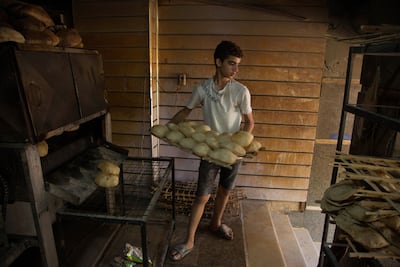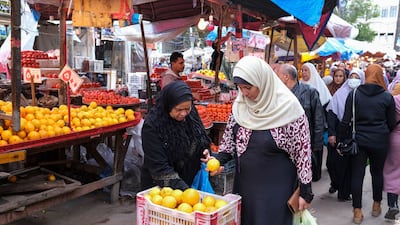Fahd has had two jobs for nearly 20 years. Early on, as a single man, it was something he did for more cash to spend. Later, the double income was needed so that he could afford to get married and start a family.
Now, the 38-year-old father of three has no choice but to continue working both jobs, yet it’s still a struggle to make ends meet.
“My two salaries are barely enough for three weeks. In the fourth week, I just borrow from friends and settle my debt when I get paid at the start of the new month," he lamented.
In many ways, Fahd, who wanted to be identified by his first name only, was fortunate to have found the two jobs that he has held down for so long.
But his long days and constant fatigue are taking a heavy toll on him and his family. He has no choice but to soldier on, knowing that giving up his second job would upend their lives in the face of soaring prices.
A slender man whose family comes from the southern city of Aswan, he leaves home for work at 6am and is never back before 11pm. That means his three boys and wife barely see him during the week. If he finishes his second job too late, which frequently happens, he sleeps at a relative’s home near his workplace.
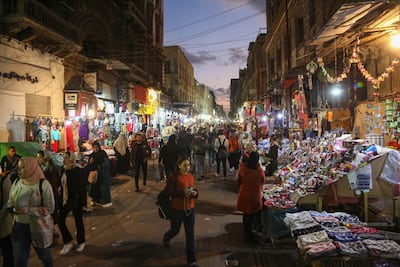
His wife of 15 years is left to take care of the children and household tasks alone. She helps the older boys — 13 and 9 — with their homework and sees to it that they show up on time for their maths and English lessons at a learning centre near their home. She also cooks, washes and presses clothes and cleans their tiny two-bedroom apartment in a shoddily-built, eight-storey building that has no lift.
The building is in Bashteel, a poor, unplanned Greater Cairo district that Fahd mischievously calls “Bashteel Plaza” — a play on the European names given to high-end suburban residential compounds.
To bring in extra cash, his wife knits shawls and table covers to sell on a website she shares with a group of other women.
As difficult as Fahd’s life is, it is neither uncommon nor extraordinary in Egypt, a country of 104 million people that has not had an economically prosperous day in living memory.
But what Fahd feels deeply is his inability to pursue his passion for writing. The 2020 Open University graduate has had five short stories published in local magazines, the last of which was in 2011.
“It’s hurting me that I am no longer able to write,” he said. "When I last wrote a short story, I had just one child and lots of energy. Now, I feel my world is running and I need to keep up. Every day.
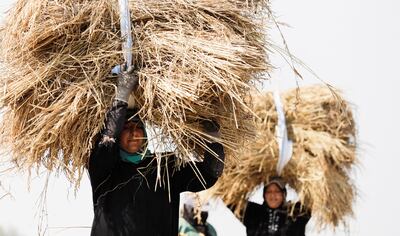
Now his relentless cycle of toil is playing out against a backdrop of an economic crisis that is affecting millions of Egyptians, pushing those who had barely survived into poverty while decimating the middle class.
Two Cairo homemakers, who spoke on condition of anonymity, shared with The National examples of the rising costs they have faced while shopping in their middle-class neighbourhoods.
A case of 30 eggs now costs at least 75 pounds ($3), up from 30-40 pounds at the start of the year, they said. A kilogram of locally grown rice sells for 18 pounds compared to 10.50 in January. Local white cheese sells for 60 pounds a kilogram, nearly double its price less than a year ago.
The inflation rate is now approaching 20 per cent and the local currency has lost nearly 40 per cent of its official value since March, at nearly 25 pounds to the dollar. The rate is nearly 35 pounds on the black market.
A shortage of foreign currency and the subsequent restrictions on imports have hit economic sectors across the board and led to a sharp rise in the price of imported goods.
Foreign investors lured by the country’s once-lucrative debt market left in a hurry after the outbreak of the Russia-Ukraine war, taking with them $20 billion to look for greener pastures. Egypt’s foreign debt stands at a staggering $155.7 billion — an increase of about 12 per cent from last year, but within safe limits relative to GDP, according to some estimates.
Egypt has turned for help to the IMF, which ratified a $3 billion loan to shore up its finances on December 16.
Things are likely to get worse before they get better.
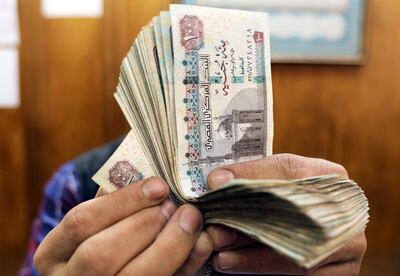
“Continued calls from the market plus the conditions of the IMF's latest deal to allow Egypt’s currency to float more freely both point towards the pound still being overvalued and to the prospect of further depreciation in 2023,” said Mitchell Diedrick, a foreign exchange dealer at Aza Finance, a global fintech company.
“It is quite possible that the official rate could be devalued further and interest rates hiked … I expect the Egyptian pound to continue weakening in the short term,” he told The National in response to emailed questions.
President Abdel Fattah El Sisi, the architect of Egypt’s economic reform programme, blames the war in Ukraine and the coronavirus pandemic before that for the economic woes.
The crisis has forced the government to spend billions of dollars to shield the most vulnerable Egyptians from soaring food prices.
The government, for example, has allowed the 70 million Egyptians who hold state-issued food cards to buy more heavily subsidised items, while putting off plans to lift subsidies on electricity charges. It has raised the minimum wage and pensions.
Economists and political commentators, encouraged by the President's call for a national dialogue this year, have voiced criticism of some of his government’s economic policies, particularly its spending of billions of dollars on mega projects since 2015.
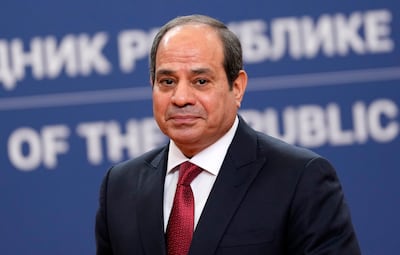
Mr El Sisi and Prime minister, Mostafa Madbouly, have defended the policy, saying projects such as the building of about two dozen new cities and thousands of kilometres of roads have compensated for decades of negligence, created millions of jobs, kept the economy afloat and prepared Egypt for the future.
“We did in five years what had been done over 100 years,” Mr El Sisi has said.
Mr Madbouly also rejected criticism that the government was doing little to bring down prices, saying his hands were tied.
He said last week that a heavy-handed intervention would lead to hoarding and urged people to use widely advertised hotlines to report retailers who sell food items at inflated prices.
“The government is not on one side and the people on another," he said. "We are all in this together until we pull through the crisis."
However, the government on Monday announced it would set a price range for essential food items to protect consumers, and gave shop owners two weeks to ensure their prices were displayed clearly and updated regularly.
The measures, which hark back to Egypt's socialist days of the 1950s and 1960s, will be difficult to enforce because of the sheer number of food outlets in a country of its size.
But to Fahd, talk about the economy and efforts to protect the poor is of little relevance to the daily struggle to match his income to his family's basic needs.
They eat red meat once a week. For fresh fish they rely on relatives travelling from Aswan, where catch from the Nile is sold at a fraction of its price in Cairo, or a friend of Fahd's on the other side of the city who offers him a significant discount.
But for most of the week, they eat cheap pasta in red sauce, lentils or rice with chicken liver.
“Friday lunch is our big meal, we normally have fresh beans or okra with meat and tomato sauce,” Fahd said, commending his wife’s cooking and her ability to make do with little.
“A year ago, my combined income of some 5,500 pounds from the two jobs was considered to be decent. Not any more after two currency devaluations.”
